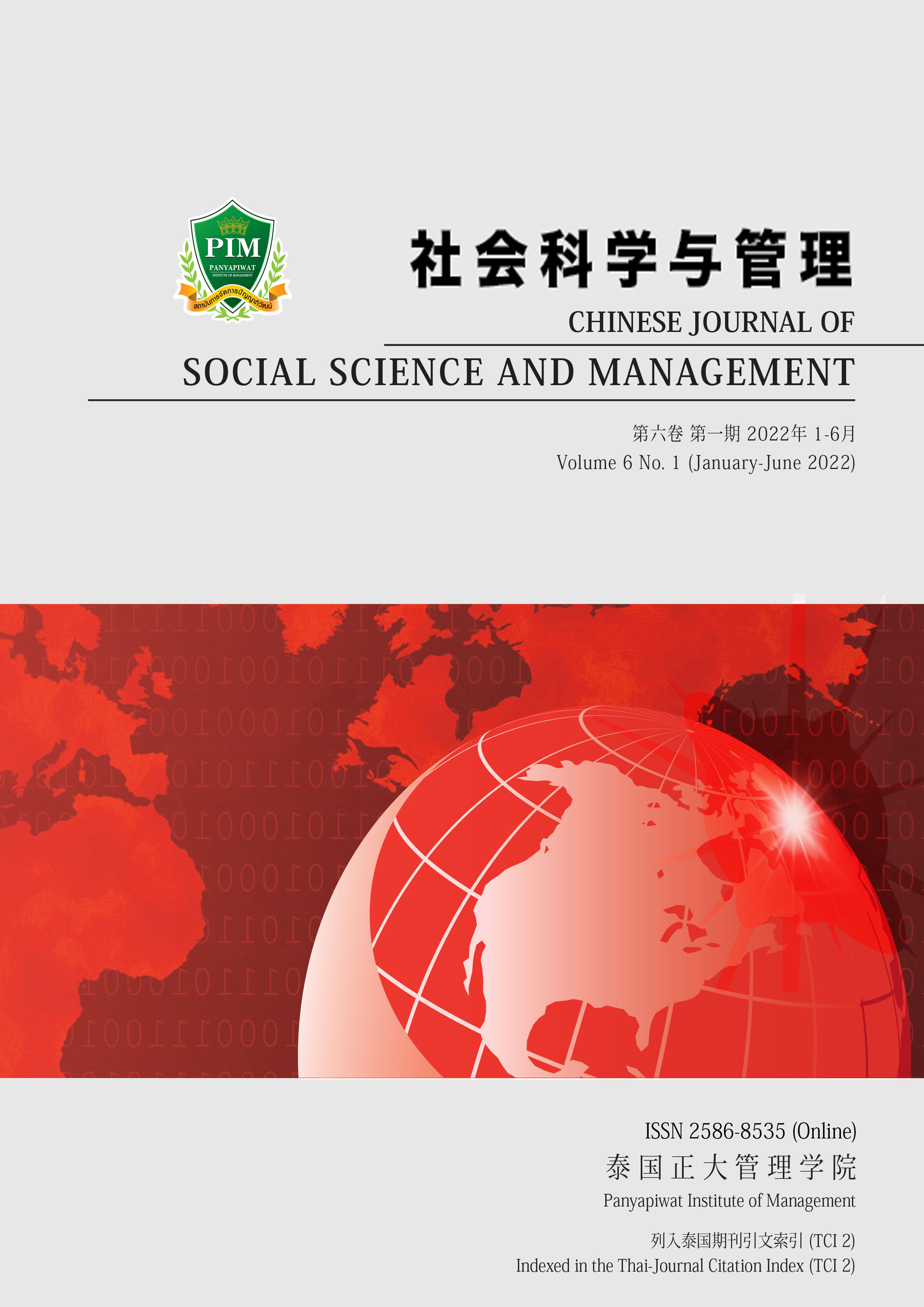THE FORMATION MECHANISM AND COUNTERMEASURE STRATEGIES OF CONFLICT ROLES BETWEEN WORK AND FAMILY
Main Article Content
Abstract
This article aimed to explore the formation mechanism of work-family conflict-type roles and to find conflict resolution strategies. The research site was in Bangkok, Thailand. In-depth interviews with 20 interviewees were conducted through video and audio methods. Based on the grounded theory, this article first used the 5W1H theory to formulate the interview outline, then used the in-depth
interview method and NVivo qualitative analysis software for data analysis, and finally used the grounded theory to establish a theoretical framework. Based on this, the formation mechanism of work-family conflict-type roles was established. The rank sum test was used to test the significance, and the previous qualitative analysis results were combined to draw a conclusion. The study found that
when the mental pressure accumulated by work and family interacted with time conflict, the conflicting role of work and family would emerge immediately. For employees, adjustment methods at the social level were also better than those at the individual level. Simultaneously, the company's incentive policy had a positive effect on alleviating the conflict between work and family. Furthermore, this article used the four quadrants of the time management theory to establish an effective work-family conflict
resolution strategy, which supplemented the existing literature and provided new ideas for fundamentally resolving employee work-family conflicts.
Article Details

This work is licensed under a Creative Commons Attribution-NonCommercial-NoDerivatives 4.0 International License.
Chinese Journal of Social Science and Management Editorial Division
The Office of Research and Development, Panyapiwat Institute of Management
85/1 Moo 2, Chaengwattana Rd., Bang Talat, Pakkred, Nonthaburi 11120, Thailand
Tel. 02 855 01048 E-mail: cjssm@pim.ac.th
References
Covey, S. R., Merrill, A. R., & Merrill, R. R. (1995). First things first. Simon and Schuster.
French, K. A., Dumani, S., Allen, T. D., & Shockley, K. M. (2018). A meta-analysis of work-family conflict and social support. Psychological bulletin, 144(3), 284.
Gao, Y., Shi, J., Niu, Q., & Wang, L. (2013). Work-family conflict and job satisfaction: Emotional intelligence as a moderator. Stress and Health, 29(3), 222-228.
Glaser, B. G., & Strauss, A. L. (2017). The discovery of grounded theory: Strategies for qualitative research. Routledge.
Höge, T. (2009). When work strain transcends psychological boundaries: An inquiry into the relationship between time pressure, irritation, work-family conflict and psychosomatic complaints. Stress and Health: Journal of the International Society for the Investigation of Stress, 25(1), 41-51.
Lasswell, H. D. (1948). The structure and function of communication in society. The communication of ideas, 37(1), 136-139.
Machín-Rincón, L., Cifre, E., Domínguez-Castillo, P., & Segovia-Pérez, M. (2020). I am a leader, I am a mother, I can do this! The moderated mediation of psychological capital, work-family conflict, and having children on well-being of women leaders. Sustainability, 12(5), 2100.
Renshaw, J. R. (1976). An exploration of the dynamics of the overlapping worlds of work and family. Family Process, 15(1), 143-165.
Rotondo, D. M., Carlson, D. S., & Kincaid, J. F. (2003). Coping with multiple dimensions of work‐family conflict. Personnel Review, 32(3), 275-296.
Takalapeta, T., & Benu, J. M. (2019). Stress management training to overcome work family conflict for teachers. Journal of Health and Behavioral Science, 1(1), 34-46.
Taylor, S. J., & Bogdan, R. (1984). Introduction to qualitative research methods: The search for meanings. Wiley-Interscience.
Warren, J. A., & Johnson, P. J. (1995). The impact of workplace support on work-family role strain. Family Relations, 44(2), 163-169.
Wilcoxon, F. (1992). Individual comparisons by ranking methods. In S. Kotz, & N. L. Johnson (Eds), Breakthroughs in Statistics (pp. 196-202). Springer Series in Statistics. Springer.
Wilson, M. G., Polzer-Debruyne, A., Chen, S., & Fernandes, S. (2007). Shift work interventions for reduced work-family conflict. Employee Relations, 29(2), 162-177.
Yadav, S., & Adhikari, B. (2019). Measures and what affects work and family balance? A literature review. Asian Journal of Multidimensional Research (AJMR), 8(6), 218-228.


